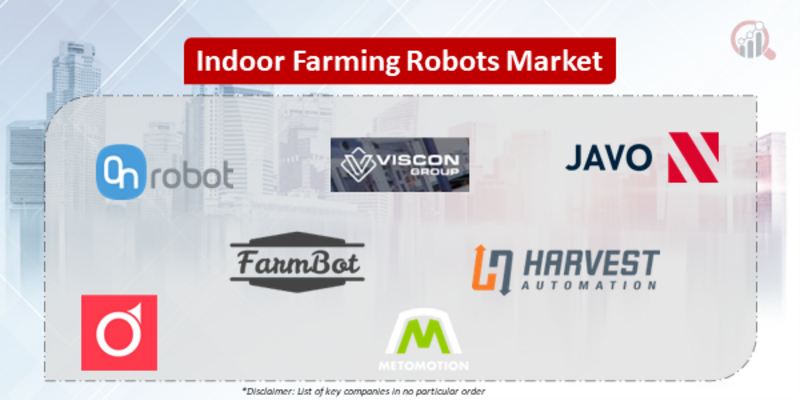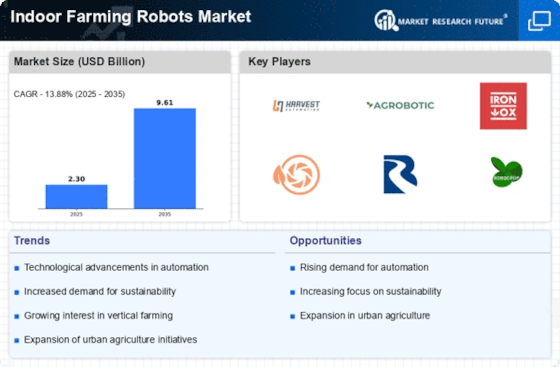Top Industry Leaders in the Indoor Farming Robots Market

The Competitive Landscape of the Indoor Farming Robots Market
The burgeoning indoor farming industry, driven by the quest for sustainable and localized food production, is fertile ground for the indoor farming robots market. These robots automate various tasks, from seeding and planting to harvesting and monitoring, promising increased efficiency, yield, and precision in controlled environments. This competitive landscape features established players and agile newcomers, each vying for market share with diverse strategies.
Some of the Indoor Farming Robots companies listed below:
- OnRobot
- Visser Horti Systems BV
- Javo
- Root AI
- Iron-ox
- FarmBot Inc.
- Metomotion
- Fodderworks
- Harvest Automation
Strategies Adopted by Leaders
- Portfolio Diversification: Offering a comprehensive range of robots encompassing seeding, transplanting, weeding, harvesting, and climate control caters to diverse farm sizes and crop types.
- Technological Innovation and Integration: Continuous R&D focuses on advanced vision systems, AI-powered decision-making, and seamless integration with farm management software for intelligent automation.
- Focus on Specific Crops and Applications: Targeting segments like vertical farms, high-value greens production, and cannabis cultivation builds expertise and attracts key customers.
- Strategic Partnerships and Collaborations: Partnering with research institutions, seed companies, and system integrators fosters knowledge sharing, accelerates technology adoption, and expands sales channels.
- Focus on Data-Driven Insights and Optimizations: Leveraging sensor data and AI analytics to optimize robot performance, crop growth, and resource utilization attracts data-driven growers.
Factors for Market Share Analysis:
- Robot Performance and Functionality: Delivering robots with precise movement, high payload capacity, and ability to handle diverse tasks sets players apart for complex operations and efficient workflows.
- Scalability and Adaptability: Offering robots adaptable to various farm sizes, layouts, and crop types caters to diverse grower needs and facilitates future expansion.
- Ease of Use and Integration: Providing user-friendly interfaces, seamless integration with existing systems, and comprehensive training empowers even new growers to adopt robot technology.
- Cost-Effectiveness and Return on Investment: Striking a balance between performance, features, and competitive pricing is crucial for attracting budget-conscious growers and demonstrating clear ROI.
- Data Security and Privacy: Ensuring robust data security measures and transparent data handling practices builds trust and compliance with industry regulations.
New and Emerging Companies:
- Niche Market Focus: Targeting specific areas like microgreens robots, pollination robots for specific crops, or robotic solutions for urban farming opens up new market opportunities.
- Focus on Emerging Technologies: Integrating technologies like machine learning for predictive maintenance, blockchain for secure data management, and robotics-as-a-service models attract tech-savvy customers and position them for future trends.
- Direct-to-Grower Sales and Engagement: Utilizing online platforms and targeted marketing enables them to bypass traditional channels and reach growers directly, offering flexible engagement models.
- Open-Source Hardware and Collaboration: Utilizing open-source design platforms and fostering collaboration with developers attracts talent and facilitates rapid innovation for specific applications.
Industry Developments:
Oct. 23, 2023- Hippo Harvest, an agriculture startup in California, announced employing Zebra robots for indoor farming operations. Integrating autonomous mobile robots from a supply chain technology solution provider, Zebra Technologies, into its indoor farming operations will enable the company to save up to 92 % of water and 55% of fertilizer than conventional produce growers.
Sep. 18, 2023- Plenty, a startup vertical farming company, announced pioneering a new way to grow leafy greens inside a high-tech indoor farm run almost entirely by robots. Plenty grows vegetables without sun, soil, or even human intervention in its facility in Compton, California. Seeds are robotically planted and moved into a giant eight-story nursery room to germinate. The rooms are lit by LEDs and optimized for each specific crop.
Jul. 05, 2023- Gestalt Robotics and Stack Tech Farm announced their collaboration on AI-based quality control for vertical farming. The goal is to monitor the cultivation of plants from seed to harvest precisely and to enable reliable and cost-effective quality control for customers at a single crop level. Stack Tech Farm has developed a mobile robot solution for vertical farming. The collaboration will enable Stack Tech Farm to take another important evolutionary technological step.
May 31, 2023- Oishii, a Japanese vertical farming company based in Jersey City, announced a partnership with Yaskawa Electric Corp.(Japan), an industrial robotics company, to develop new automation solutions to optimize vertical farming methods and scale output. Oishii is best known for its strawberries, and a series of Yaskawa robotic arms will power its indoor vertical strawberry farm.
May 12, 2023- Seasony (Denmark) announced the development of an autonomous mobile robot designed for indoor farming, Watney. This new robot will solve the specific challenges in indoor and vertical farming. Seasony aims to make vertical farms more scalable, profitable, and sustainable.









